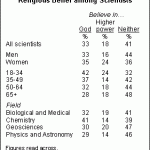Pew survey
As I noted when the Pew science survey was released last month, there was a disturbing tendency among some bloggers and commentators to seize upon the findings as yet more evidence of a "dangerous divide," a "widening disconnect," and a "gulf" between scientists and the public. I summarized some of the problems with this narrative at the time as did others.
In a follow up article at The Scientist titled "Are Scientists Really Out of Touch?," several researchers who have conducted similar surveys of scientists and the public have noted their own reservations about the "dangerous divide" claims…
One of the overlooked findings of the Pew survey of U.S.-based scientists is that roughly 51% say that they either believe in God (33%) or a higher power (18%) and roughly 30% self-identify as Protestant (20%) or Catholic (10%). The findings cut against a commonly voiced claim by many outspoken atheists that scientists are overwhelmingly non-religious and that a scientific worldview is incompatible with religious belief.
In addition, among the sample of AAAS members surveyed, roughly 2/3 of scientists ages 18-34 say that they believe in God (42%) or a higher power (24%). This is in sharp…
Over at the liberal blog site Daily Kos, the anonymous "Dark Syde" reviews the book Unscientific America. The review, unfortunately, echoes the all-too-common "fall from grace narrative" about the place of science in American society, a distracting if not harmful myth that we discuss in a forthcoming journal article and that I noted Friday.
All the trademark "fall from grace" metaphors, catchphrases, and references are included in the Daily Kos review including claims about a rise in "anti-science," "know-nothingness," open contempt for science, and a "long national slide into pseudoscience…
Over at MIT's Knight Science Journalism Tracker, the wise Charlie Petit has a great round-up of coverage of yesterday's Pew science survey. On what I described earlier today as a troubling "fall from grace" narrative in some reporting and commentary, Petit points to the obvious difficulties science reporters might have in covering an issue they deeply care about:
One notes that bylines [in coverge] tend to belong to science writers. Science writers can hope to cover science itself with a semblance of objective dispassion. But they have an inbuilt conflict of interest when the topic is the…
Somewhat predictably, several pundits and commentators have framed Thursday's Pew survey as supporting an all too common yet misleading "fall from grace" narrative about the place of science in society.
These interpretations proclaim a "growing disconnect," "a dangerous divide," a "widening gulf" and use other metaphors that are representative of what sociologists might label as a moral panic. This traditional fall from grace narrative about science argues for the need to return to a (fictional) point in the past where science was better understood and appreciated by the public. In the U.S…
[UPDATE: See this follow up on media reaction to the report.]
The Pew Research Center released today a major new survey report documenting Americans' views of science and technology and comparing these lay perceptions to a representative sample of U.S. scientists who are members of AAAS.
As part of a panel of experts, I had the chance to contribute input and ideas on the survey earlier this year. I have been eagerly looking forward to the findings ever since. Below I have jotted down a few key implications that come to mind on my first scan.
I will have more to say next week and probably…
